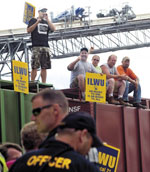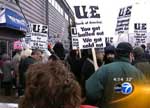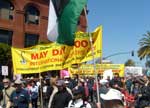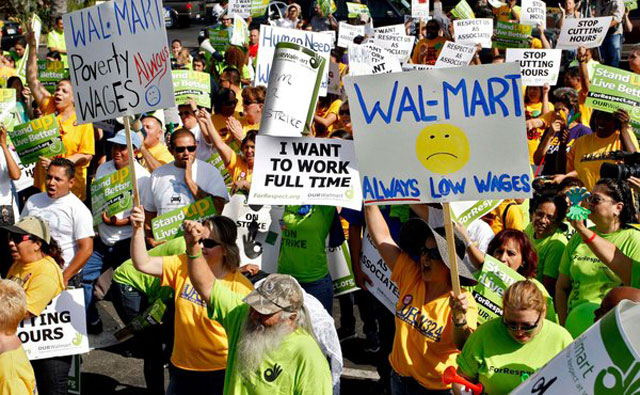
Showdown on West Coast Docks: The Battle of Longview
(November 2011).
click on photo for article

Chicago Plant Occupation Electrifies Labor
(December 2008).
click on photo for article

May Day
Strike Against the War Shuts Down
U.S. West Coast Ports
(May 2008)
click on
photo for article
November 2012
Walkouts
Show Potential for Class Struggle
Protests Called at Stores Across U.S.

Protest by Walmart strikers and supporters at Pico Rivera, California, a center of walkouts, October 4.
(Photo: Jonathan Alcorn/Reuters)
Walmart, the Arkansas-based commercial empire founded by Sam Walton, is the largest private employer in the United States (with 1.3 million employees), Mexico (175,000), Latin America (325,000) and the world, with a total of over 2 million “associates” around the globe. It is also almost completely non-union, and that’s no accident. Walmart management has been found guilty of systematically keeping women and racial minorities in low-paying positions, locking night-shift workers in its stores, bribing governments, exposing workers to serious health hazards, paying less than the minimum wage and keeping workers in part-time positions to avoid paying for health care. Walmart workers complain of endless abuse, and are unable to make ends meet without food stamps and Medicaid for their children. Now on “Black Friday,” November 23, the day after Thanksgiving and the biggest shopping day of the year, protests have been called at up to 1,000 Walmart facilities around the U.S. Supporters of labor rights should join in.
The stage has
been set by unprecedented actions this fall
when Walmart workers walked off the job in
several states beginning in September in
Illinois and Southern California. In early
October, walkouts hit 28 stores in 12 states.
Then on November 15 workers struck at a
warehouse in Pico Rivera, California, in
Seattle, Washington and Dallas, Texas. The
strikers threw down the gauntlet to Walmart,
challenging the long-held belief that Walmart
is too powerful (or “too evil”) to organize.
But in doing so, workers have also challenged
the hidebound labor movement, which so far has
failed miserably to unionize the retail giant.
Instead of doing the hard work of signing up
workers and
showing they are prepared to defy anti-labor
laws, the unions (notably the United
Food and Commercial Workers) have relied on
consumer boycotts and legislation seeking to
keep the low-wage chain out of key
metropolitan centers.
Such softball tactics are doomed to fail in the long run. Labor’s gotta play hardball to win. Walmart can be unionized – it just can’t be done playing by the bosses’ rules. Virtually every effective tactic of workers’ struggle has been declared illegal. That just means that workers have to stand up to cops and courts as well as a vicious anti-union company. Rather than being an unbeatable monolith, Walmart is a fluid chain of distribution centers and outlets, whose “just-in-time” distribution system depends heavily on the work of just a few employees to make the gears turn. A disruption at one part of the system has consequences throughout the whole. Rather than concentrating our efforts on boycotting Walmart in favor of other companies who also exploit their workers, the unprecedented strikes carried out by warehouse and retail workers so far have shown that the power to bring Walmart to its knees lies with the workers themselves.
“Every strike reminds the capitalists that it is the workers and not they who are the real masters—the workers who are more and more loudly proclaiming their rights. Every strike reminds the workers that their position is not hopeless, that they are not alone.”
–V.I. Lenin, “On Strikes” (1899)
The recent, first-ever strikes against Walmart in the U.S. were only partial stoppages, which rather than shutting down whole shops slowed things down considerably. Yet they have had a significant impact on Walmart … and the conventional wisdom of labor officialdom. They have broken through the logic that Walmart is too tough to organize, the excuse used by union bureaucrats to justify their policy of lobbying politicians rather than organizing workers. Although workers who participated in the walkouts are backed by unions, they aren’t recognized by management. Their work stoppages therefore fall outside the many legal snares that workers with contracts often face. UFCW has lately changed its tune regarding Walmart, urging workers to organize their own store actions and walkouts through the Organization United for Respect at Walmart (OUR Walmart) campaign. But organized labor has never used its muscle to shut down Walmart.
The walkouts demonstrated also how sections of seemingly unconnected workers can quickly act in concert with each other. Warehouse workers near Riverside, California sparked a wave of rebellion among Walmart workers when they walked off the job to protest working conditions in early September. Limber Herrera, a warehouse worker in Riverside describes her workplace, “So many of my coworkers are living in pain because of the pressure to work fast or lose our jobs. We often breathe a thick black dust that gives us nosebleeds and headaches. We want Walmart to take responsibility and fix these bad working conditions” (Warehouse Workers United, 9 August). In early September, in what came to be known as the “WalMarch,” dozens of workers who are supporters of WWU marched for six days from San Bernardino County to downtown Los Angeles demanding that their employer address working conditions and safety.
The workplace action quickly spread. Warehouse workers in Elwood, IL backed by the United Electrical Workers (UE), struck retail giant Walmart’s largest distribution center on September 15. They demanded better working conditions and an end to wage theft on the part of Walmart contractor, Roadlink. The Walmart strikers spoke at strike rallies of the Chicago Teachers Union (CTU), which pointed out that the Walmart foundation supports the privatization of schools. The warehouse workers complained of erratic work hours, low pay and unsafe working conditions, where they are often asked to hand lift extreme loads and work without shin guards or proper masks. Like many Walmart workers, the warehouse staff don’t work directly for Walmart, but are hired instead through subcontractors. The strike ended after two weeks, with Roadlink promising to end all retaliation against employees who speak out. However, recent reports are that the intimidation tactics have continued.
But the Riverside and Elwood workers lit a spark that inspired solidarity strikes at several Walmarts in several states in the weeks that followed. Under the leadership of OUR Walmart and backed by UFCW, a group of 200 supporters disrupted Walmart’s annual investors meeting in Bentonville Arkansas. The workers have given Walmart a deadline: meet our demands for better pay and working conditions and stop all retaliation against workers who participate in workplace organizing, or there will be a strike on Black Friday, November 22-23. Walmart has now retaliated by lodging a complaint against the UFCW with the National Labor Relations Board and threatening to sue the union. Meanwhile, Walmart “associates” have been ordered to report for work as early as 3 p.m. on Thanksgiving Day, provoking angry complaints from workers who intend to spend the traditional holiday with their families.
Hardnosed Walmart
execs won’t stand idly by as they lose
millions in potential profits, and they won’t
stop at lawsuits if their past actions are any
indication of future actions. Their labor
practices traditionally include bare-knuckle
intimidation, firings, and in the most
successful organizing situations, mass layoffs
and store closures. The first Walmart store to
be unionized in North America was in
Jonquière, in northern Québec in
2004. We traveled there to report the story
(see “Attention
Wal-Mart Workers: Union Victory in Quebec,”
The
Internationalist No. 20,
January-February 2005). But the multinational
retail chain retaliated by shutting the store.
With Walmart facing a cross-country campaign,
they may resort to new and even more ruthless
efforts to squash any efforts to organize or
unionize their stores. Workers will need the
support of labor and community allies if they
intend to bring down the behemoth.
In the face of mass unemployment, capitalists figure workers will be so desperate to hold onto a job, no matter how poorly paid, that they will be to afraid to unionize. But desperation can also produce militancy. It’s happened before. In January-February 1937, auto workers occupied the Fischer Body No. 1 plant in Flint, Michigan. Running off the cops and facing down National Guard machine guns, the sit-down strike won after five weeks. This electrified labor. In March, 110 women workers sat down at the Woolworth 5-and-10 chain store in Detroit, protesting against nickel-and-dime wages. Women workers at the Woolworth store in New York’s Union Square followed suit. Within seven days, as union leaders threatened to call a national strike, the company gave in to the strikers’ demands. What was key was the example of militant action by the Flint auto workers, the enthusiastic support of unions, and refusal to be intimidated by the bosses’ laws. Naturally, two years later the Supreme Court ruled sit-down strikes illegal.
As Black Friday 2012 approaches, activists in a number of cities are planning solidarity actions. But consumer boycotts almost never work (the claim that the United Farm Workers won with the grape boycott is a myth), because they fail to mobilize labor’s power. A real strike would aim at Walmart’s supply chain, and would require solid mass pickets that no one dares cross. Walmart workers can’t do that on their own, but a serious mobilization of unions can. If hundreds of unionists are on the lines, Teamsters and even many non-union truckers would honor the picket lines. These are the kind of tactics necessary to challenge the corporate monster. What’s effective in stopping the chain from bleeding communities dry is not “withholding our dollar” from the store, but “withholding our labor” from the shop floor. But that requires a willingness to defy cops, courts and capitalist politicians, Democrats and Republicans alike, to whom the sellout labor bureaucracy are beholden.
The fight to organize the unorganized has always been a watchword of revolutionaries in the labor movement. Today that task is as urgent as it has ever been, but neither “normal” trade-union or liberal pressure tactics can fulfill it. What is required is genuine class-struggle unionism, the potential for which is shown by the recent victory of immigrant workers at the Hot and Crusty bakery/restaurant in New York City. “If you play by the bosses’ rules, you’re bound to lose,” read workers’ signs during 55 days on the picket line. The struggle culminated in an inspiring labor victory with a groundbreaking contract that includes a union hiring hall, virtually unprecedented in the “restaurant sweatshops” staffed by hundreds of thousands of super-exploited immigrants. Having participated intensively in this struggle, the Internationalist Group has stressed that the Hot and Crusty victory could spark major new struggles in the area and beyond (see “Hot and Crusty Workers Win with Groundbreaking Contract,” at www.internationalist.org).
Only by fighting to build a class-struggle opposition in the ranks of labor, together with the support of other workers and the oppressed, will it be possible to shatter the stranglehold of the “labor lieutenants of capital.” Old-style business unionism and even reformist “social justice unionism” won’t work in these times of all-sided capitalist attack on working people. Life on the Walmart plantation is hell. What’s needed is to break the chains that bind wage slaves to the modern slave masters, to build a workers party to fight for a workers government. Solidarity, one section of workers defending another and recognizing that our interests are the same, isn’t just a nice idea: it’s the only possible way in which workers at Walmart, or anywhere else, can fight back effectively and win. Courageous actions by Walmart workers can lead the way forward, and demonstrate that what it takes to win is class struggle. ■
To contact the League for the Fourth International or its sections, send an e-mail to: internationalistgroup@msn.com